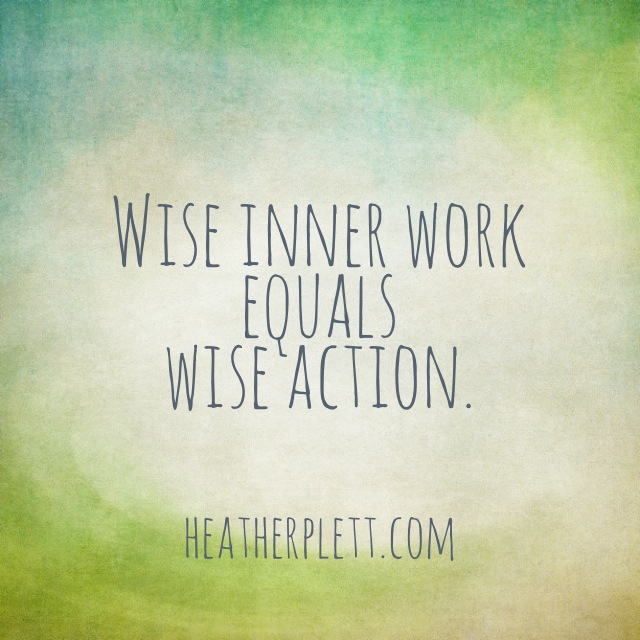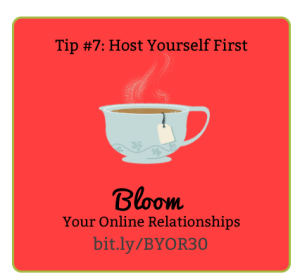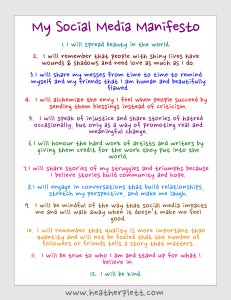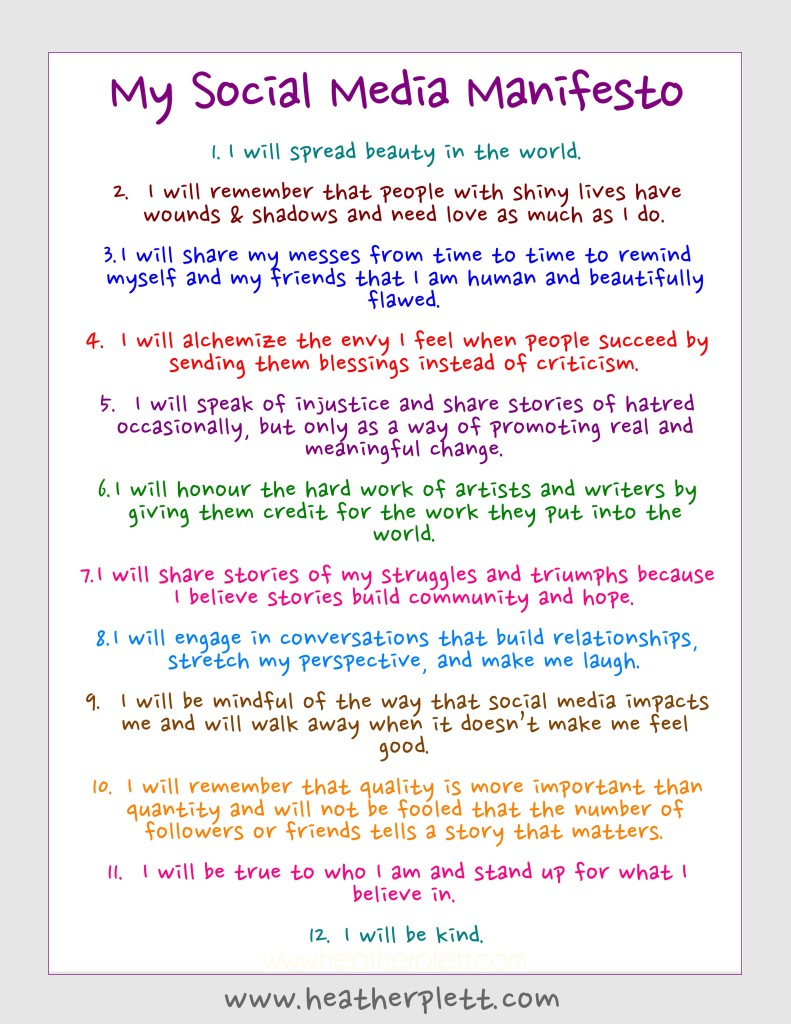A personal post about becoming a change-maker
“The success of our actions as change-makers does not depend on what we do or how we do it, but on the inner place from which we operate.” – Otto Sharmer
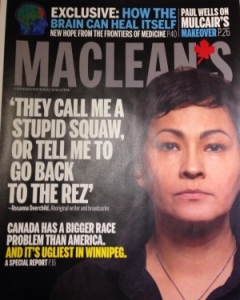 Last week, the city that I love and call home was named “the most racist city in Canada.” That hurt. It felt like someone had insulted my family.
Last week, the city that I love and call home was named “the most racist city in Canada.” That hurt. It felt like someone had insulted my family.
The article mentions many heartbreaking stories of the way that Indigenous people have been treated in our city, and while I wanted to say “but… we’re so NICE here! Really! You have to see the other side too!” I knew that there was undeniable truth I had to face and own. My family isn’t always nice. Neither is my city.
Though I work hard not to be racist, have many Indigenous friends in my circles, and am married to a Metis man, I knew that my response to the article needed to not only be a closer look at my city but a closer look at myself. I may not be overtly racist, but are there ways that I have been complicit in allowing this disease to grow around me? Are there things that I have left unsaid that have given people permission for their racism? Are there ways in which my white privilege has made me blind?
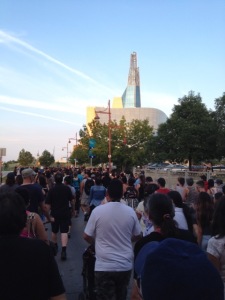 Ever since the summer, when I attended the vigil for Tina Fontaine, a young Indigenous woman whose body was found in the river, I have been feeling some restlessness around this issue. I knew that I was being nudged into some work that would help in the healing of my city and my country, but I didn’t know what that work was. I started by carrying my sadness over the murdered and missing Indigenous women into the Black Hills when I invited women on a lament journey.
Ever since the summer, when I attended the vigil for Tina Fontaine, a young Indigenous woman whose body was found in the river, I have been feeling some restlessness around this issue. I knew that I was being nudged into some work that would help in the healing of my city and my country, but I didn’t know what that work was. I started by carrying my sadness over the murdered and missing Indigenous women into the Black Hills when I invited women on a lament journey.
This week, after the Macleans article came out, our mayor made a courageous choice in how he responded to the article. In a press conference called shortly after the article spread across the internet, he didn’t get defensive, but instead he spoke with vulnerability about his own identity as a Metis man and about how his desire is for his children to be proud of both of the heritages they carry – their mother’s and his. He then invited several Indigenous leaders to speak.
There was something about the mayor’s address that galvanized me into action. I knew it was time for me to step forward and offer what I can. I sent an email and tweet to the mayor, thanking him for what he’d done and then offering my expertise in hosting meaningful conversations. Because I believe that we need to start healing this divide in our city and healing will begin when we sit and look into each others’ eyes and listen deeply to each others’ stories.
After that, I purchased the url letstalkaboutracism.com. I haven’t done anything with it yet, but I know that one of the things I need to do is to invite more people into a conversation around racism and how it wounds us all. I have no idea how to fix this, but I know how to hold space for difficult conversations, so that is what I intend to do. Circles have the capacity to hold deep healing work, and I will find a way to offer them where I can.
Since then, I have had moments of clarity about what needs to be done next, but far more moments of doubt and fear. At present, I am sitting with both the clarity and the doubt, trying to hold both and trying to be present for what wants to be born.
Here are some of the things that are showing up in my internal dialogue:
- Isn’t it a little arrogant to think I have any expertise to offer in this area? There are so many more qualified people than me.
- What if I offend the Indigenous people by offering my ideas, and become like the colonizers who think they have the answers and refuse to listen to the wisdom of the people they’re trying to help?
- There are already many people doing healing work on this issue, and many of them are already holding Indigenous circles. I have nothing unique to contribute.
- What if I host sharing circles and too much trauma and/or conflict shows up in the circle and I don’t know how to hold it?
- What if this is just my ego trying to do something “important” and get attention for me rather than the cause?
And so the conversation in my head goes back and forth. And the conversations outside of my head (with other people) aren’t much different.
At the same time as this has been going on, I have been working through the first two weeks of course material for U Lab: Transforming Business, Society and Self. In one of the course videos, Otto Sharmer talks about the four levels of listening – from downloading (where we listen to confirm habitual judgements), to factual (listening by paying attention to facts and to novel or disconfirming data), to empathic (where we listen with our hearts and not just our minds), and finally to generative (where we move with the person speaking into communion and transformaton).
As soon as I read that, I knew that whatever I do to help create space for healing in my city, it has to start with a place of deep listening – generative listening, where all those in the circle can move into communion and transformation. I also knew, as I sat with that idea, that that generative listening has to begin with me.
If I am to serve in this role, I need to be prepared to move out of my comfort zone, into generative listening with people who have been wounded by racism in our city AND with people who live with racial blindspots. AND (in the words of Otto Sharmer) I need to move out of an ego-system mentality (where I am seeking my own interest first), into a generative, eco-system mentality (where I am seeking the best interest of the community and world around me).
So that is my intention, starting this week. I already have a meeting planned with an Indigenous friend who has contributed to, and wants to teach, an adult curriculum on racism, to find out how I can support her in this work. And I will be meeting with another friend, a talented Indigenous musician, about possible partnership opportunities. And I will be a sitting in an Indigenous sharing circle, listening deeply to their stories.
I am not sharing these stories to say “look at me and all of the good things I’m doing”. That would be my ego talking, and that’s one of the things I’m trying to avoid. Instead, I’m sharing it to say “look at the complexity that a thinking woman (sometimes over-thinking woman) goes through in order to become an effective, and humble, change-maker.
That brings me back to the quote at the top of the page.
“The success of our actions as change-makers does not depend on what we do or how we do it, but on the inner place from which we operate.” – Otto Sharmer
The inner place. That is what will determine the success of our actions. I can have all the smart ideas in the world, and a big network of people to help roll them out, but if I have not done the internal work first, my success will be limited.
If I don’t do the inner work first, then my ego will run rampant and I will stomp all over the people that I say I care about. Or I will suffer from jealousy, or self doubt, or self-centredness, or vindictiveness, or all of the above.
If I don’t do the internal work and ask myself important questions about what is rooted in my ego and what is generative, then I could potentially do more harm than good.
So how do I do that internal work? Here are some of the things that I do:
1. As we say in Art of Hosting work, I host myself first. In other words, I ask of myself whatever I would ask of others I might invite into circle, I look for both my shadows and my strengths, and I do the kind of self-care I would encourage my clients to do when they find themselves in the middle of big shifts.
2. I ask myself a few pointed questions to determine whether the ego is too involved. For example, when my friend came to me to share the work she wants to do, hosting circles in the curriculum she has developed, there was a little ego-voice that spoke up and said “But wait! This was supposed to be YOUR work! If you support her, you’ll have to be in the background.” The moment I heard that voice, I had to ask myself “do you truly want to make a difference around the issue of racism or do you just want to make a name for yourself?” And: “If this is successful in impacting change, but you have only a secondary role, is it still worthwhile?” It didn’t take long for me to know that I wanted to be wholeheartedly behind her work.
3. I pause. As we learn in Theory U, the pause is the most important part – it’s where the really juicy stuff happens. The pause is where we notice patterns that we were too busy to notice before. It’s where the voice of wisdom speaks through the noise. It’s where we are more able to sink into generative listening. In Theory U, we call it “presencing” – a combination of “presence” and “sensing”. There’s a quality of mindfulness in the pause that helps me notice and experience more and be awake to receive more wisdom.
4. I do the practices that help bring me to wise thought and wise action. For me, it’s journaling, art, mandala-making, nature walks, and labyrinth walks. I never make a major decision without spending intentional time in one of those practices. Almost always, something more profound and wise shows up that I wouldn’t have considered earlier.
5. I listen. The ego doesn’t want me to seek input from other people. The ego wants to be in control and not invite partners in to share the spotlight. If I want to move out of ego-system, though, I need to spend time listening for others’ stories and wisdom. This doesn’t mean I listen to EVERYONE. Instead, I use my discretion about who are the right people to seek wise council from. I listen to those who have done their own personal work, whose own egos won’t try to trap me and keep me from succeeding, and who genuinely care about the issue I’m working on.
6. I check in with myself and then move into action when I’m ready. Although the pause, the questions, and the personal practice are all very important, the movement into action is equally important. There have been far too many times when my questions and ego have trapped me in a spiral and I’ve failed to move into action. Just thinking about it won’t impact change. I need to be prepared to act, even if I still have doubt. If I fail in that action, I can always go back and re-enter the presencing stage.
This is an ongoing story and I hope to continue sharing it as it emerges. If you, too, want to become a change-maker, then I’d love to hear from you. What are the processes you go through in order to ensure your “inner place” is healthy and your listening and actions are generative? What issues are currently calling you into action?
If this resonates with you, check out The Spiral Path, which begins February 1st. Based on the three stages of the labyrinth, (release, receive, and return), it invites you to go inward to do this internal work and then to move outward to serve in the way that you are called.
Also… we’re looking for a few more change-makers to attend Engage, a one-of-a-kind retreat that will teach you more about how to do your inner work so that you can move into generative action.

